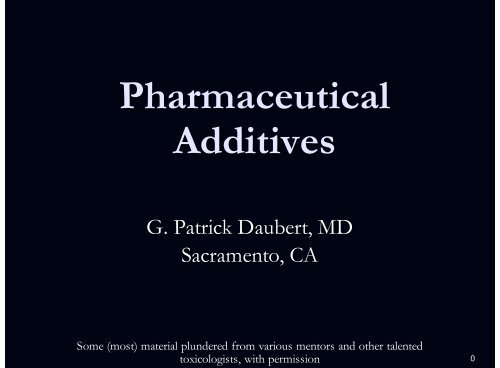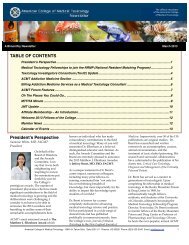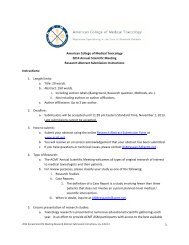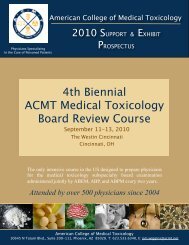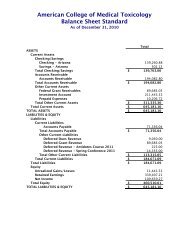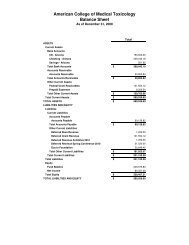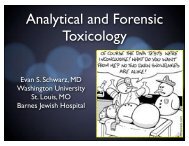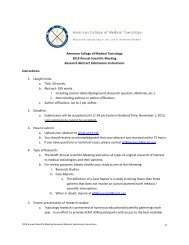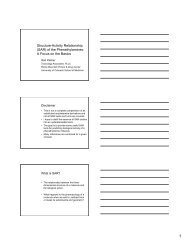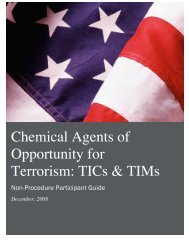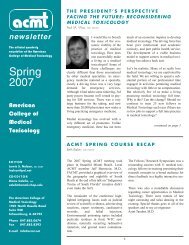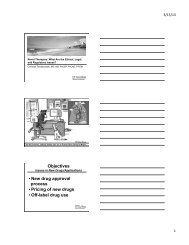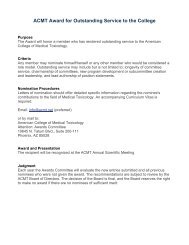Pharmaceutical Additives
Pharmaceutical Additives
Pharmaceutical Additives
You also want an ePaper? Increase the reach of your titles
YUMPU automatically turns print PDFs into web optimized ePapers that Google loves.
<strong>Pharmaceutical</strong><br />
<strong>Additives</strong><br />
G. Patrick Daubert, MD<br />
Sacramento, CA<br />
Some (most) material plundered from various mentors and other talented<br />
toxicologists, with permission<br />
0
MENU<br />
n<br />
n<br />
n<br />
2.1.12 <strong>Pharmaceutical</strong> <strong>Additives</strong><br />
2.1.13 Veterinary Products<br />
2.1.14 Vitamins<br />
0
<strong>Pharmaceutical</strong> <strong>Additives</strong><br />
n<br />
n<br />
n<br />
n<br />
n<br />
n<br />
n<br />
n<br />
Propylene glycol<br />
Polyethylene glycol<br />
Benzyl alcohol<br />
Vit E ferol<br />
Benzalkonium chloride<br />
Thimerosol<br />
Tryptophan<br />
Sorbitol<br />
n<br />
n<br />
n<br />
n<br />
n<br />
n<br />
n<br />
Chlorbutanol<br />
Parabens<br />
Diethylene glycol<br />
Thallium<br />
Thorotrast<br />
Thalidomide<br />
DES<br />
0
<strong>Pharmaceutical</strong> <strong>Additives</strong><br />
n<br />
n<br />
Propylene glycol<br />
n IV preps pushed rapidly<br />
n Hypotension, bradycardia, asystole<br />
n Prolonged infusions<br />
n Lactic acid production<br />
Polyethylene glycol<br />
n Toxicity concern with low MWs (< 400)<br />
n Risk of renal tubular necrosis<br />
0
Gasping Syndrome<br />
n<br />
n<br />
n<br />
n<br />
In 1981 16 neonatal deaths occurred in a NICU<br />
All were pre-term neonates < 2500 gm<br />
Symptoms included severe AGMA, respiratory<br />
depression with gasping, and encephalopathy<br />
All neonates had received bacteriostatic NaCl or<br />
water flushes containing 0.9% benzyl alcohol<br />
0
Gasping Syndrome<br />
n<br />
n<br />
n<br />
Benzyl alcohol is normally oxidized rapidly to<br />
benzoic acid, conjugated with glycine in the liver,<br />
and excreted as hippuric acid<br />
This metabolic pathway is well developed in<br />
premature infants<br />
The benzyl alcohol was metabolized to benzoic<br />
acid causing metabolic acidosis<br />
0
DEG and Sulfanilamide<br />
n September-October 1937<br />
n<br />
n<br />
n<br />
n<br />
n<br />
S.E. Massengill Co., used DEG diluent in<br />
sulfanilamide elixir<br />
Vomiting, abdominal pain, anuria, seizures, coma<br />
105 deaths in 15 states<br />
n<br />
34 children<br />
Hydropic tubular nephrosis<br />
Development of the Food, Drug, and Cosmetic Act<br />
0
Polysorbate 80 and E-Ferol<br />
n Polysorbate 80 = polyproblems<br />
n Released december 1983<br />
n<br />
n<br />
n<br />
IV form of a vitamin E preparation (E-Ferol)<br />
Fatalities among low birth weight (< 1,500 g) and<br />
premature infants<br />
n<br />
38 deaths and 43 cases of severe morbidity<br />
n<br />
n<br />
n<br />
n<br />
Thrombocytopenia<br />
Renal failure<br />
Cholestasis<br />
Ascites<br />
Inhibitory effect by this vitamin E preparation on the in<br />
vitro response of human lymphocytes to<br />
phytohemagglutinin<br />
0
Eosinophilia Myalgia Syndrome<br />
n<br />
n<br />
n<br />
n<br />
n<br />
n<br />
October 1989, the health department in New Mexico was<br />
notified of 3 patients with an unexplained acute illness<br />
Characterized by intense myalgia, dyspnea, extremity<br />
edema, neuropathy, and peripheral blood eosinophilia<br />
By July 1991, 1543 cases and 31 deaths were attributed to<br />
EMS<br />
Some L-tryptophan may have been produced by a new<br />
bacteria causing an unknown bi-product<br />
EMS lead to the Dietary Supplement Health and<br />
Education Act of 1994<br />
Syndrome resembled Toxic Oil Syndrome (rapeseed oil)<br />
0
<strong>Pharmaceutical</strong> <strong>Additives</strong><br />
n<br />
n<br />
Benzalkonium chloride<br />
n Most common ophthalmic preservative<br />
n Cytotoxic to corneal epithelium<br />
n Compromised cornea (keratoconjunctivitis)<br />
Chlorbutanol<br />
n Structure similar to trichloroethanol<br />
n Chloral hydrate active metabolite<br />
n IV thiamine preps<br />
0
<strong>Pharmaceutical</strong> <strong>Additives</strong><br />
n Thorotrast (thorium dioxide 25%)<br />
n<br />
n<br />
n IV radiocontrast medium (1928-1955)<br />
n Delayed hepatic angiosarcoma<br />
Thalidomide<br />
n<br />
n<br />
Antiemetic (1960s)<br />
5,000 infants born with severe congenital abnormalities<br />
(phocomelia)<br />
DES (Diethylstilbestrol)<br />
n<br />
n<br />
DES mothers – breast CA<br />
DES daughters – vaginal clear cell adenoCA<br />
0
Question<br />
Which of the following pharmaceutical additives is<br />
associated with acute renal dysfunction<br />
A. Chlorobutanol<br />
B. Polysorbate 80<br />
C. Thimerosol<br />
D. Vit E ferol<br />
E. Xylitol<br />
0
Question<br />
Which of the following pharmaceutical additives is<br />
associated with acute renal dysfunction<br />
A. Chlorobutanol<br />
B. Polysorbate 80<br />
C. Thimerosol<br />
D. Vit E ferol<br />
E. Xylitol<br />
0
Vitamins<br />
0
Vitamin A<br />
n<br />
n<br />
n<br />
n<br />
Binds retinal binding proteins to maintain vision,<br />
epithelial cell integrity<br />
Deficiency: night blindness, Bitot spots on conjunctiva<br />
with corneal drying (xerosis)<br />
Acute toxicity defined > 12,000 IU/kg<br />
Chronic toxicity > 25,0000 IU/day for 2-3 weeks<br />
n<br />
n<br />
n<br />
Pseudotumor cerebri (IIH):<br />
Hepatoxicity potential<br />
Teratogenic<br />
0
Vitamin D<br />
n<br />
n<br />
n<br />
Ca/Phos intestinal absorption, bone<br />
development, parathyroid gland function<br />
Deficiency: adults - osteomalacia, peds – rickets<br />
(craniotabes, rachitic rosary, genu varum)<br />
Toxicity<br />
n Acute: hypercalcemia, muscle weakness<br />
n Chronic: nephrocalcinosis, renal failure<br />
0
Vitamin E<br />
n<br />
n<br />
n<br />
n<br />
Antioxidant<br />
Deficiency: preterm infants have large requirement<br />
(ROP, BPD, IVH, hemolytic anemia)<br />
Recall polysorbate 80 and E-Ferol in <strong>Pharmaceutical</strong><br />
<strong>Additives</strong><br />
Toxicity<br />
n<br />
n<br />
Antagonizes epoxidation of vitamin K (anticoagulant effect)<br />
Muscle weakness, nausea, diarrhea, headache<br />
0
Vitamin K1<br />
n<br />
n<br />
n<br />
n<br />
Vitamin K1 = phytonadione (vitamin K3 is not<br />
clinically relevant)<br />
Synthesis of factors II, VII, IX, X, protein C<br />
Deficiency: rare except in newborns (bleeding episodes)<br />
n<br />
Hemorrhagic disease of the newborn occurs if vit K1 is not<br />
given at birth<br />
Toxicity<br />
n<br />
n<br />
Jaundice in premature infants<br />
IV preps associated with anaphylaxis<br />
0
Vitamin B1 (Thiamine)<br />
n<br />
n<br />
n<br />
Coenzyme (TTP) in oxidative metabolism of glucose<br />
and ketoacid decarboxylation<br />
Deficiency:<br />
n<br />
n<br />
Wet beriberi – high output cardiac failure<br />
Dry beriberi – Wernicke-Korsakoff syndrome: oculomotor<br />
changes, ataxis, global confusion. Seen in malnourished such<br />
as alcoholism and gastric bypass<br />
Toxicity: antiquated literature reported anaphylactoid<br />
reactions with IV dosing. May be due to previous<br />
formulations containing chlorbutanol<br />
0
Vitamin B2 (Riboflavin)<br />
n<br />
n<br />
n<br />
FAD coenzyme in oxidative-reduction reactions<br />
Deficiency: anorexia, mucositis, cheilosis,<br />
nasolabial seborrhea<br />
Toxicity:<br />
n Yellow urine<br />
n Increased riboflavin excretion with boric acid toxicity<br />
(blue-green vomit, boiled lobster appearance)<br />
0
Vitamin B3<br />
(Niacin or Nicotinic acid)<br />
n<br />
n<br />
n<br />
n<br />
NAD coenzyme for oxidative-reduction reactions<br />
Deficiency: pellagra (4 Ds: diarrhea, dermatitis,<br />
dementia, death)<br />
Toxicity:<br />
n<br />
n<br />
Niacin flush (skin flush, headache, pruritis, vasodilation).<br />
Mediated by prostaglandins, not histamine<br />
n<br />
Use aspirin to treat<br />
Used by some young adults to adulterate urine to “beat” drug<br />
tests<br />
Vacor (PNU) antidote<br />
0
Vitamin B6 (Pyridoxine)<br />
n<br />
n<br />
n<br />
n<br />
Cofactor for GAD in GABA synthesis<br />
n<br />
Converted to active form pyridoxal phosphate by pyridoxine<br />
phosphokinase<br />
Deficiency: Seizures<br />
n<br />
Isoniazid, Gyromitra esculenta (false morel), hydrazines (high<br />
output fuels)<br />
Toxicity: peripheral sensory neuropathy with excessive<br />
chronic dosing or large acute ingestions<br />
Antidote: INH, G. esculenta, hyrdrazines, ethylene glycol<br />
poisoning<br />
0
Vitamin B12 (Cyanocobalamin)<br />
n Coenzyme for 5-methyltetrahydrofolate formation,<br />
DNA synthesis, myelin<br />
n Deficiency: megaloblastic anemia with peripheral<br />
neuropathy (post/lat columns, foot drop)<br />
n Toxicity: probably none<br />
n Nitrous oxide abusers (dentists): bone marrow<br />
suppression, and pernicious anemia. Histochemistry<br />
reveals inactive cobalt and inhibition of methionine<br />
synthetase<br />
n Antidote: CN – Hydroxycobalamin (synthetic B12)<br />
0
Vitamin C<br />
n Reducing agent and antoxidant, Cr6+ g Cr3+, collagen<br />
metabolism<br />
n Deficiency: scurvy (poor wound healing, bleeding<br />
gums, bone pain)<br />
n Toxicity: > 1.5 grams IV or chronic oral intake > 4<br />
grams/day<br />
n<br />
n<br />
n<br />
n<br />
n<br />
Calcium oxalate with ARF (urinary acidification), chronic<br />
nephropathy<br />
G6PD hemolysis<br />
Gouty arthritis due to decreased urate excretion<br />
h Fe absorption leading to hemochromatosis<br />
Antidote: congenital methemoglobinemia<br />
0
Question<br />
Which of the following clinical manifestations is<br />
associated with excessive vitamin C use<br />
A. Esophagitis<br />
B. Flushing of the skin<br />
C. Megaloblastic anemia<br />
D. Nephrolithiasis<br />
E. Peripheral neuropathy<br />
0
Question<br />
Which of the following clinical manifestations is<br />
associated with excessive vitamin C use<br />
A. Esophagitis<br />
B. Flushing of the skin<br />
C. Megaloblastic anemia<br />
D. Nephrolithiasis<br />
E. Peripheral neuropathy<br />
0
Food <strong>Additives</strong><br />
0
Food <strong>Additives</strong><br />
n<br />
Regulated by FDA and categorized into 5 groups<br />
n Enhance texture<br />
n Improve nutritional value (ie, vitamins)<br />
n Maintain freshness/safety<br />
n Regulate acidity<br />
n Provide flavoring/coloring<br />
0
Food <strong>Additives</strong><br />
n<br />
n<br />
n<br />
Sulfites (red wines): hypersensitivity reactions<br />
Nitrates<br />
n Hypotension (hotdog syndrome)<br />
n Infants convert nitrates to nitrites –<br />
methemoglobinemia<br />
NaOH and KOH: skin, mucous membrane<br />
irritation<br />
0
Food <strong>Additives</strong><br />
n MSG: “Chinese restaurant syndrome” –<br />
flushing, headache, chest pain, vomiting, rare<br />
angioedema, bronchospasm<br />
n Yellow dye #5: hypersensitivity reactions<br />
n Aspartame: three metabolites – aspartic acid,<br />
phenylalanine, methanol (minute)<br />
n Patients with PKU unlikely to accumulate toxic<br />
levels of phenylalanine<br />
n Saccharin: bladder CA in animals<br />
0
Question<br />
A young boy presents to the hospital with acute<br />
urticaria after eating lemon cake. What was the<br />
likely food additive to which he is allergic<br />
A. Aspartame<br />
B. Metabisulfite<br />
C. Monosodium glutamate<br />
D. Saccharin<br />
E. Tartrazine<br />
0
Question<br />
A young boy presents to the hospital with acute<br />
urticaria after eating lemon cake. What was the<br />
likely food additive to which he is allergic<br />
A. Aspartame<br />
B. Metabisulfite<br />
C. Monosodium glutamate<br />
D. Saccharin<br />
E. Tartrazine (Yellow dye #5)<br />
0
Questions<br />
Good Luck!!<br />
0


